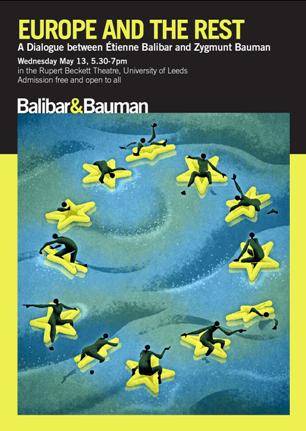Europe and the Rest: A Dialogue between Etienne Balibar and Zygmunt Bauman
- Date
- Wednesday 13 May 2009, 17:30 - 19:00
- Location
- Rupert Beckett Theatre, University of Leeds
 What is the current status of Europe in a globalized world, and who gets to be or call themselves 'European'?
What is the current status of Europe in a globalized world, and who gets to be or call themselves 'European'?
For those of you able to make it along, you may be interested in this event next week organised by Institute for Colonial and Postcolonial Studies here at Leeds.
Mark Davis:
What struck me most about Bauman’s presentation, and the subsequent debate with Balibar, was how he retains a sense of optimism almost uniquely for Europe, repeating his proclamation that it remains an ‘unfinished adventure’. It was interesting, therefore, to see Bauman firmly entrenched in the ‘optimistic’ camp and for him to set out with such verve and passion the challenges that he sees currently facing younger generations of Europeans in seeking – as he has put it many times – to reunite ‘power’ with ‘politics’.
This is especially pertinent to my own current involvement with the Council of Europe, as we are beginning from the premise that in order to meet today’s global challenges (such as those that Bauman has identified) we must first involve young people in developing a shared vision for – and then seeking collectively to establish – a ‘Europe of shared responsibility’…
Terry Wassall:
Balibar is an interesting character. He was one of Louis Althusser’s pupils at the École Normale Supérieure and a participant in Althusser’s seminar on Karl Marx’s Das Kapital. This seminar resulted in the book entitled Reading Capital which Althusser and Balibar coauthored with other students in the seminar group. Althusser was undoubtedly one of the most influential marxists of the 60s and 70s. He intoduced the concept of ‘ideological state apparatuses’ (ISAs) and ‘interpellation’, a process that structured subjects’ identity and commonsense view of the world. Perhaps his most famous contribution was his analysis of the ‘epistemological break’ he detected between the writings of the young and older Marx. He got the idea of epistemological break from one of his main influences, Gaston Bachelard (who figured in my Phd). Unfortunately it seems he was mentally unstable and he murdered his wife in 1980. His career took a bit of a dive after that!
